Your infant’s first year is marked by several developmental milestones, such as rolling over, sitting up, and even their first steps. While there are some who would rather wait a little longer, there are those who choose to begin potty training as early as a year old.
Perhaps the best tool that you can use to supplement early potty training for your 1-year-old is by forming different types of associations. For example, changing their diapers in the bathroom, getting them on a schedule, incentivizing, and even making verbal cues when they relieve themselves.
Aside from learning the signs that your baby is ready for potty training, it can also help you to be consistent in your approach, remain calm during accidents, and such. However, you must understand that some babies are not ready at this age and that you should accept it if your baby is not ready.
This article will detail the steps you need to take to early potty train your 1-year-old, as well as the signs to look out for to know when your baby is ready for it.
Early Potty Training 1-Year-Old
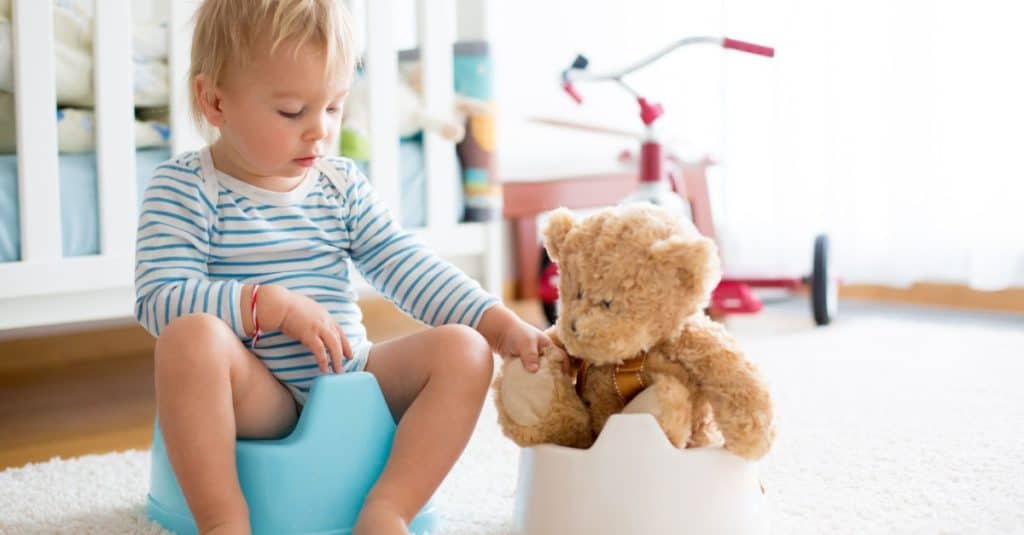
Potty training is a huge milestone for a baby. For practically all of their lives since birth, babies have had to rely on other people to do everything for them. Parents have to feed them, bathe them, and change their diapers/clothes. Potty training is one of many steps toward their own individuality and independence.
The age range when babies typically learn to potty train varies greatly. According to the American Academy of Family Physicians, the average age of potty training used to be earlier than 18 months. Nowadays, that average range has become 21-36 months of age.
While it is perfectly normal to wait a little later to potty train, studies have shown that early potty training might have some advantages.
For one, mastering potty training at an earlier age sets the child at an accelerated rate of development. Not only does potty training teach the child a new skill, but the training itself helps develop new motor skills, vocabulary, and even self-esteem.
Additionally, other benefits include the decreased risks of UTI and other infectious diseases, as well as the alleviation of the financial burden of having to purchase diapers constantly – not to mention that ending the use of disposable diapers is much better for the environment.
Some parents wait until their babies begin to show an interest in beginning potty training. However, some children simply never show an interest, further delaying their own development.
While the thought of potty training so early might seem like a complicated process, it has been done before – and you can do it as well. The following tips should serve as a guide to help you achieve success in this endeavor.
Signs Your 1 Year Old is Ready to Be Potty Trained
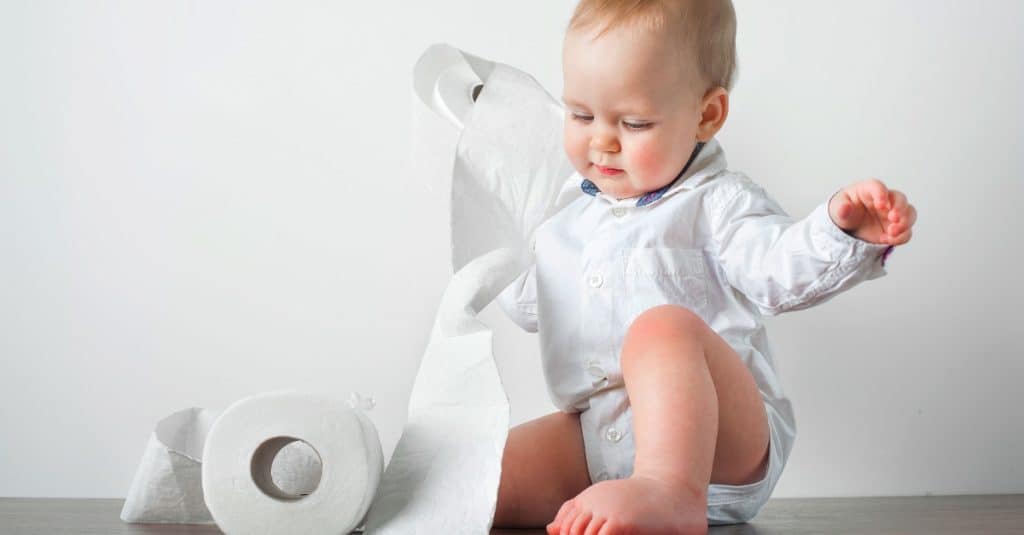
There are several benefits of potty training your baby early. However, you will have to understand that not all babies can be potty trained so early. The sooner you understand whether your baby can or cannot yet begin potty training, the better your chances of not wasting your time fighting a losing battle.
-
Communication
Perhaps one of the first signs that your baby is ready for potty training is communication – particularly verbal communication. Potty training is a relatively advanced task for a baby; therefore, it is paramount that you are able to communicate with them effectively.
Your baby does not need an extensive vocabulary at the start. However, potty training can go significantly smoother if they are able to learn certain words, such as “diaper,” “poo poo,” “pee pee,” and other words that will be helpful in communicating during potty training.
Communication is an essential key to successful potty training because communication allows the association of certain words to how the baby feels or what the baby needs. For example, the baby should be able to tell you whether they want to pee or not.
After a few months, many parents are already able to tell whether their babies are about to pee or poop. It could be the way they behave or even a twitch on their faces. This means that their bodies are aware of such sensations – they just need to be more mindful of them.
-
Displeasure with Waste
A helpful aspect of human nature that can benefit potty training is the innate desire of human beings to stay clean. Even before they are able to say their first words, babies are already able to cry and let you know if they have soiled their diapers. This is the first sign that they are uncomfortable not being clean.
The innate desire to stay clean becomes more apparent as the baby grows older. They actively become clearer when they want their dirty diapers to be changed.
-
Interest
Lastly, a common attribute associated with their displeasure with waste is a keen interest in the toilet and staying clean. At a year old, babies are already mobile and are easily drawn to where their curiosities bring them. A common behavior is for babies to follow their parents to the toilet.
Following parents to the toilets is one of several pieces of key evidence that they are showing interest in the toilet.
While interest is not necessarily required to begin potty training, it is an incredibly powerful tool that will help the process significantly. A child may be forced to begin potty training, but it is clearly easier to lead them to it instead.
The Guide to Early Potty Training
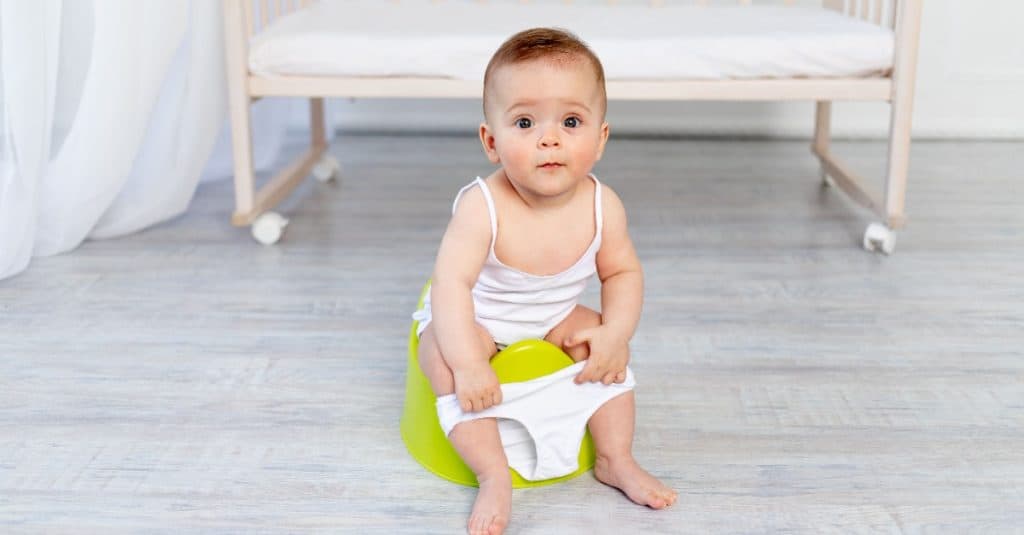
Once you are familiar with the signs, you can then perhaps decide for yourself whether your baby is ready or not. While it may be a challenge, successfully potty training your baby at an early age will make things simpler for you down the road.
Here are some steps to help guide you in early potty training your 1-year-old:
-
Change Their Diapers in the Bathroom
Before you even begin potty training, there are steps you can preemptively take to help boost your chances of success when you decide to actually begin the potty training. One of these preemptive steps is to change your baby’s diapers in the bathroom.
Understandably, the bathroom may not be the most convenient place in the house for diaper changes, especially if you already have a changing station set up in the nursery. However, changing their diapers in the bathroom does offer a significant benefit.
By changing your baby’s diaper in the bathroom, you begin associating the bathroom with them doing their business early. Some babies are incredible creatures of habit, and the early association will significantly help them learn that the bathroom is where potty should be done.
-
Get Them on a Schedule
When your baby was born, there was no sense of timing at all. Without a developed circadian rhythm (commonly known as a body clock), babies do whatever they want, whenever they want. This is one reason why they probably kept you up all night.
However, after taking care of the baby for a few months, you have probably noticed that they have begun getting accustomed to your day-to-day schedule. Though there may still be accidents at night, they are relatively more used to your routine now.
With their meals happening at the same time every day, you might also notice that their bathroom schedules can become relatively scheduled as well.
The predictability will be an incredible asset to you when you begin their potty training because you can time their potty training sessions according to their typical bathroom schedules.
Plenty of parents complain about their kids sitting in the potty for long periods of time without anything happening so doing this will significantly boost your chances of success.
Piggybacking on this tip, it is a common suggestion to avoid starting potty training when something big is happening in their lives. For example, it is not going to be conducive to potty training when you have just moved houses, given birth to another baby, or some other event that can stir things up.
-
Make Additional Associations
It may seem like there are plenty of tips suggesting the strengthening of associations. Potty training can be quite a challenging skill for a baby to learn, especially for one so young. Thus, it is important to make use of all the advantages you can get.
Aside from associating potty with changing their diapers in the bathroom and getting them on a schedule, you can further strengthen certain associations through other means.
For example, you can monitor your baby until they go potty. As their parent, you must have noticed certain visual cues already that signify your baby is doing their business. When they are relieving themselves, you can make a noise or sound that can eventually associate with them going.
Some parents make a hissing sound that resembles running water when their babies are peeing, thereby associating the sound with pee. Words such as potty and pee are also constantly used during these occasions to help link the words to the events.
Once you begin potty training, these verbal associations will be incredibly helpful to encourage your baby to go pee or potty in the toilet. Even if they are yet not yet sure of it, their brains can hopefully let them know what they are meant to do based on the sounds you are making.
Even if your baby is already able to communicate that they need to go potty, these verbal cues will surely come in handy.
-
Remain Calm
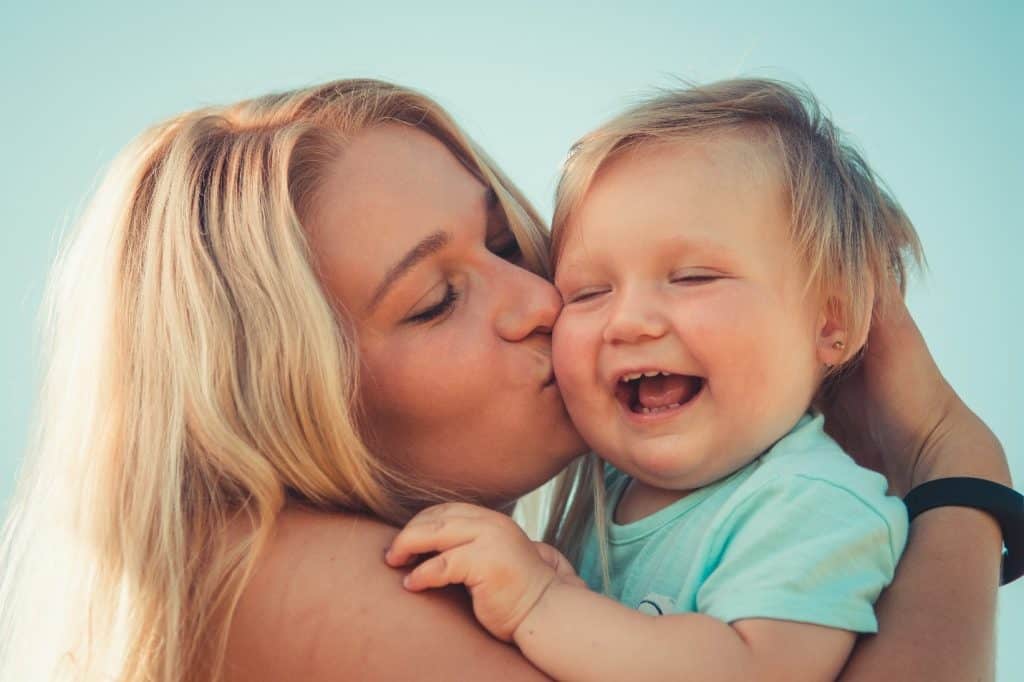
Potty training is a long and arduous process. You cannot expect your baby to get it immediately, especially if you are early potty training your 1-year-old. It is important to remember that how you deal with certain obstacles will affect the overall process.
Oftentimes, parents can resort to anger when dealing with accidents. Understandably, parents can be overworked and exasperated. Thus, it is important to remember that not only are you dealing with a baby, but you are also dealing with an incredibly young one.
When accidents happen, it is highly recommended to remain calm and relaxed. You should be able to communicate reasonably with your kid. Children are highly influential. Thus, a calm and direct manner will avoid stressing them out about it.
You will have to accept that you will be cleaning up after many accidents before they get the hang of it. It is best to remind yourself that everyone had to go through this learning phase – including yourself.
-
Consistency
Just like any other skill, it is important to go about potty training consistently. The more consistent you are with your baby’s potty training, the more effective it will be.
Your baby has been peeing and going potty in their diaper for basically their entire life. For them, that is the norm. Potty training goes against what they have gotten used to in a very drastic way.
Introducing a new method for them to do their business can give them the impression that it is a new option, rather than the total alternative. This means that they might think they can either pee or poop in their diapers or in the potty.
Being consistent is important to make them realize sooner that it is not an option, but rather what they should be doing all the time from now on. Just like how practice makes perfect, consistency will help solidify potty training much sooner compared to a less consistent regimen.
-
Allow Nighttime Diapers
Even the staunchest advocates of early potty training would not deny babies a good night’s sleep. Thus, it is recommended to put a pause on strict potty training during nighttime.
By now, your baby will not be wetting the bed as much as before, especially if they have a relatively scheduled body. Relieving themselves before sleep should be more than enough to empty the tank. Therefore, it should not be too much of a concern.
However, you must remember that they are still indeed babies. While it is important for them to learn how to go to the toilet to do their business, getting their proper amount of sleep is more important.
Parents who share the bed with their babies can sometimes tell when their sleeping babies are about to pee or poop. These situations can still be used to help strengthen potty training by taking them to the potty. Some parents place a potty beside the bed to avoid having to run to the bathroom at night.
-
Use Incentives
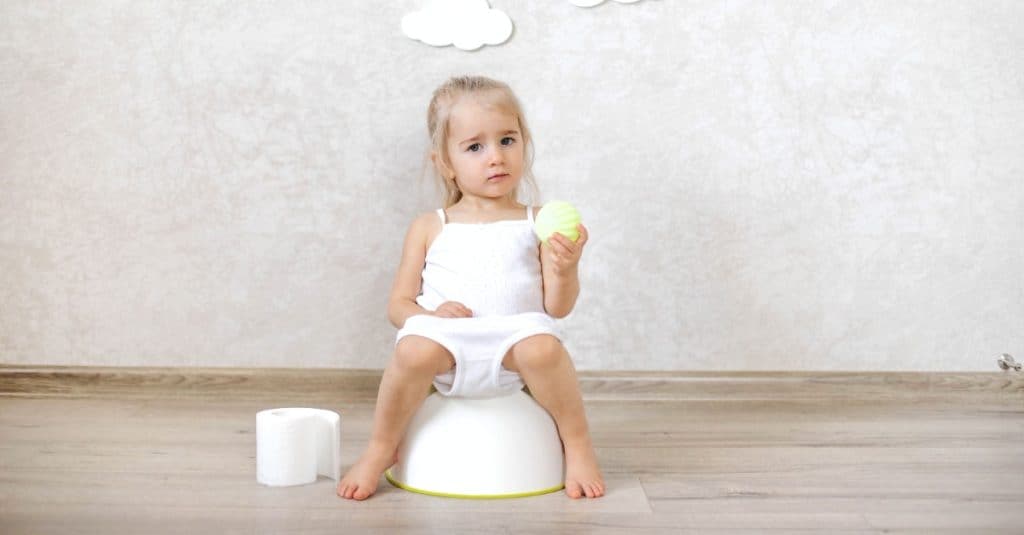
Another tool that should always be in your arsenal is incentives. No matter what your baby likes, there must be something that you can use to reward them for doing a good job during potty training. Incentives are a great way to associate success in potty training with positive reinforcement.
The simplest forms of incentivizing your baby for a job well done include praise and positive affirmations. It has long been studied that infants are highly receptive to affirmations. Therefore, appraisals can benefit your baby’s potty training greatly.
You also have access to a wide range of physical incentives that you are sure your baby enjoys. For example, giving your infant their favorite toy after a successful potty training session will always be a good idea.
While sweets can also be a powerful incentive, some parents would recommend against using sweets as an incentive to avoid forming such a strong association between sweets and success just because of how unhealthy sweets can be.
-
Accept Reality
There are multiple benefits of early potty training. As mentioned before, it stops the reliance on disposable diapers, it is more environmentally responsible, it can help develop your child much earlier, and so on.
However, you must also be realistic about your situation. Each child is different, and while some babies might be ready for early potty training, yours might not be. It is important to accept reality because starting potty training is going to be an uphill battle if your baby is not ready.
If you have begun to early potty train your 1 year old and they’re not showing signs that they are ready, you might have to accept reality and wait a little bit more. While you can still continue to potty train your baby, it will definitely be more difficult.
Final Thoughts
The very thought of early potty training can be daunting, especially when readiness is typically practiced in western countries. With toddlers now typically starting potty training between 21-36 months, it can be quite challenging to imagine your baby potty training at a year old.
However, you must understand that early potty training was the norm before. Additionally, it still remains to be the norm in other parts of the world. Thus, it is more than possible to early potty train your baby.
As long as your baby is showing signs of being ready for potty training, it stands to reason that your baby is capable of learning how to use the potty despite their young age. The tips above are just some of the many tools that can help you guide your baby to a new milestone.